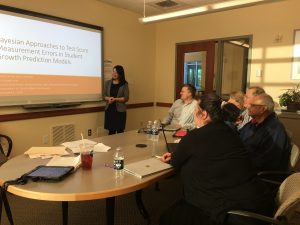Dakota Cintron, a Ph.D. student in RMME, is an ETS Gulliksen Fellow for the 2019-2020 academic year. Congratulations, Dakota!
Archived Posts
New, Fully Online Master’s Program in RMME.
NEW: Fully Online Master’s Program in RMME!
Pei-Hsuan Chiu successfully defended her dissertation,”Bayesian Approaches to Test Score Measurement Errors in Student Growth Prediction Models”
Pei-Hsuan Chiu successfully defended her dissertation, entitled “Bayesian Approaches to Test Score Measurement Errors in Student Growth Prediction Models”

Dr. Betsy McCoach delivered a keynote address at the International Conference on Educational Measurement, Evaluation and Assessment in Abu Dhabi, UAE
RMME Professor Dr. Betsy McCoach recently delivered a keynote address at the 2nd International Conference on Educational Measurement, Evaluation and Assessment in Abu Dhabi, UAE
David Alexandro successfully defended his dissertation entitled “Aiming for Success: Evaluating Statistical and Machine Learning…”
RMME graduate student completes internship at ETS
Dakota Cintron recently completed an internship at ETS, where he conducted research on response time modeling.
Danielle Bousquet hired as Associate Education Consultant at the Connecticut State Dept. Ed.
Ph.D. Candidate Danielle Bousquet was recently hired as an Associate Education Consultant at the the Connecticut State Department of Education. Danielle will work to refine and evaluate Connecticut’s Next Generation Accountability System for districts and schools.
David Alexandro hired as Associate Education Consultant at the Connecticut State Dept. Ed.
Ph.D. Candidate David Alexandro was recently hired as an Associate Education Consultant in the Performance Office at the Connecticut State Department of Education. Dave will take a lead role in the development, evaluation and delivery of the Early Indication Tool (EIT), Connecticut’s early warning system to identify students who may be at-risk of dropping out of school.
Dakota Cintron is a Robert Wood Johnson Health Policy Research Scholar
Dakota Cintron is a Robert Wood Johnson Health Policy Research Scholar.
Dr. McCoach is a keynote speaker for Second International Conference on Educational Measurement Evaluation and Assessment
Dr. McCoach is a keynote speaker for the Second International Conference on Educational Measurement Evaluation and Assessment (ICEMEA) in Abu Dhabi, United Arab Emirates (October 2018).
